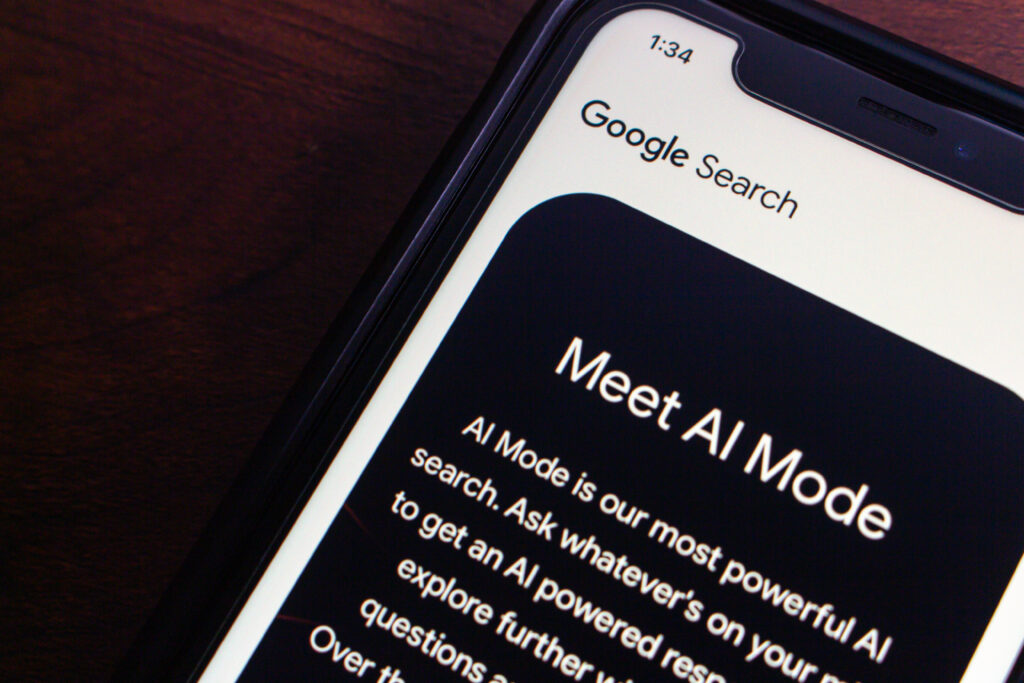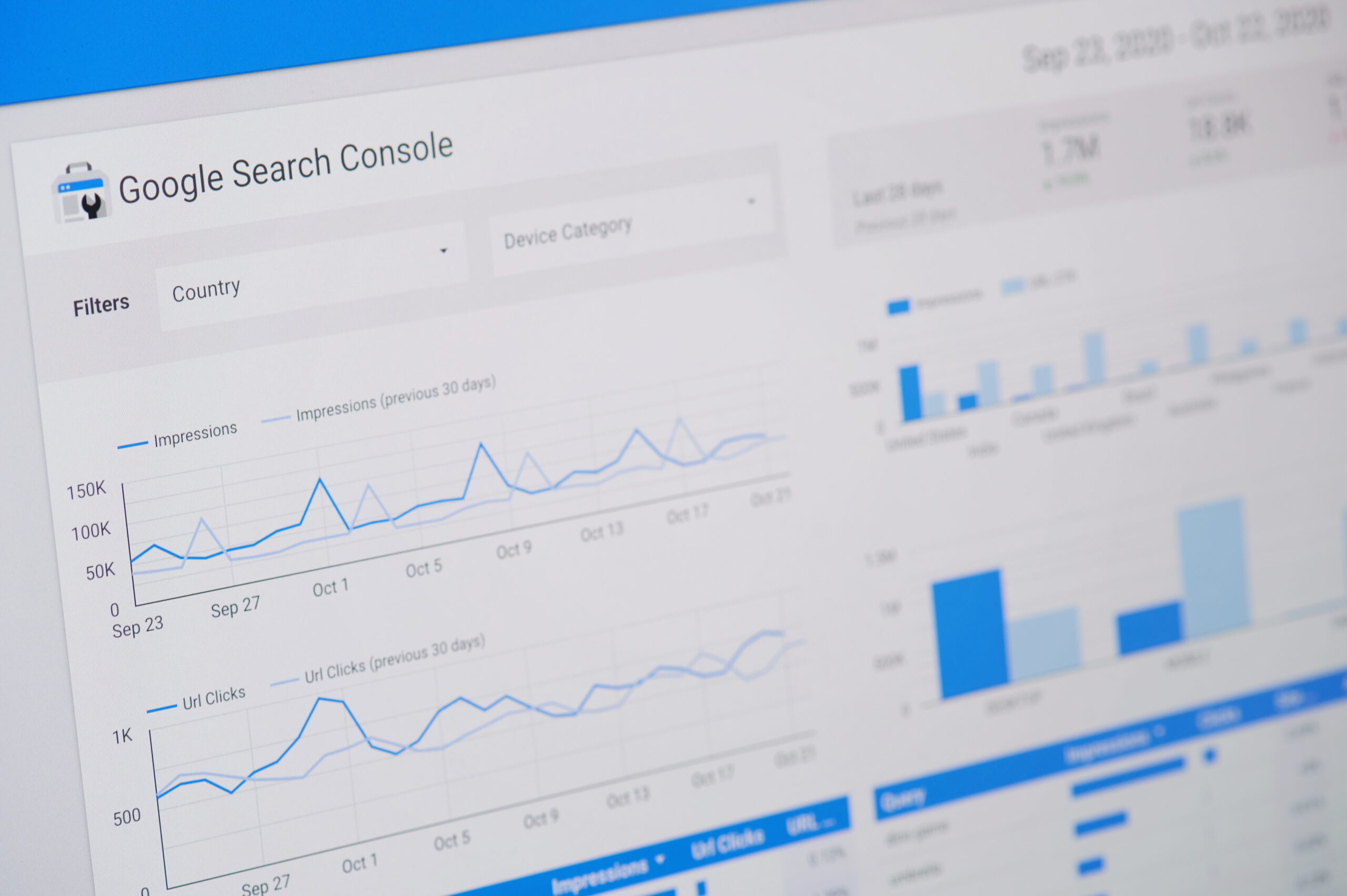Jump to a topic:

Over the last month, Google has introduced a new tool in the UK. You’ve probably heard of it – Google AI Search. This feature generates answers using artificial intelligence to provide quick, simple responses to your questions. Rather than the typical long list of blue links popping up after hitting send, users now see a concise AI-generated summary with only a handful of links included.
Whilst that’s great for searchers, for businesses it raises a real challenge: fewer clicks and fewer opportunities to get noticed. A new analysis by the Authoritas analytics company found that a site previously ranked first in a search result could lose around 79% of its traffic for that query if the results appeared below an AI Overview, showing just how disruptive this change could be. That’s why the ability to rank in AI search results can’t be ignored, especially with every business competing for those top spots.
So, let’s take a look at our 5 actionable strategies to optimise your website for AI-driven search; increasing brand impressions, climbing the rankings and driving more qualified visitors to your site.
5 Key Strategies to Rank in AI Search Results
- Add Schema to Help Google Understand Your Content
- Structure Content in a Clear, Snippet-Friendly Way
- Keep Your Website Fast and Seamless
- Build Human Authority
- Track and Measure AI-Specific Metrics
1. Add Schema to Help Understand Your Content
Adding schema markup is like giving Google a ‘cheat sheet’ for your website. It’s a small bit of behind-the-scenes code that labels important information- whether that’s products, services, reviews, FAQs or opening hours.
When an AI search tool can instantly recognise what your content is about, it’s far more likely to show it in rich results like star ratings, FAQs or ‘People Also Ask’ boxes. For small businesses, this means more visibility and higher click-through rates without needing to create more content; you’re simply helping search engines read and present what you already have.
Some of the most valuable schema types include:
FAQ Page – Marks up frequently asked questions and answers. This is one of the most common formats pulled into AI overviews, helping your content appear directly under popular queries.
HowTo – Best for step-by-step guides or tutorials. Adding this schema makes it easier for AI search to extract instructions, comparisons, or processes and display them understandably for users.
Review– Highlights customer feedback, star ratings, and testimonials. When implemented correctly, it can display star ratings in results, instantly building trust.
LocalBusiness– Essential for businesses with a physical location. It allows you to tag key details like opening hours, address, and services, making your site more likely to show up in AI-driven local searches. For example, a local cafe using LocalBusiness schema could appear with opening hours and reviews directly in the AI summary.
Article– Used for blogs, news posts or editorial content. By adding article schema, Google can more easily understand the author, publish date and context, making your article a stronger candidate for snippets.
Collectively, these schema types make your content easier for AI tools to break down and more attractive to showcase, without you having to create new pages from scratch.
2. Structure Content in a Clear, Snippet Friendly Way
AI search relies largely on clarity and how clearly you construct your content. If your content is well-structured, easy to scan, and directly answers common questions, it stands an increased chance of being featured for summaries and snippets.
How to optimise:
1. Concise Answers to Queries:
Always start your web page content with brief, well-structured answers to common questions. This elevates the user experience but also aligns with AI’s preference for clear and immediate value. It’s also useful to integrate the question into your answer to increase the likelihood of showing up in the Google AI search results.
For example, if your page is about mortgage rates, begin with a single sentence explaining what they are before diving into comparisons.
2. Opt for Lists & Tables:
Organised information is key to increasing the opportunity of being selected. Laying your info out in such a way means AI tools can simply take out the data from these formats, making them ideal for showcasing step-by-steps, comparisons or summarised information.
3. Choose Your Headings Carefully
Take the time to scan through headings, making sure content is sectioned beneath descriptive headings and subheadings. This helps both search engines and AI understand the content’s structure and significance, improving your chances of being highlighted.
4. Leverage Text Fragments
Text fragments allow you to direct search engines to specific sections of a webpage, essentially “highlighting” precise information for AI tools. For instance, by including a URL with #:~:text= followed by the targeted text, you can define both start and end points within your content, guiding AI algorithms to the most relevant parts.
Studies reveal that optimising content for the AI featured snippet can increase CTR by over 40%, proving that formatting your content for AI search is worth the effort.
3. Keep Your Website Fast and Seamless
Technical SEO ensures that AI search engines can efficiently crawl, understand and rank your content. AI-driven algorithms want to reference sites that are speedy, mobile-friendly and simple to navigate. If your site is slow or poorly structured, you risk being overlooked, no matter how good your content may be.
To stay competitive, it’s worth running regular health checks. It’s a good idea to utilise a website audit tool, like the one provided by SEMrush, to flag technical issues and identify steps to ensure your site is healthy, fast and optimised to appear in AI search results.
Here are the key areas to get right:
Mobile Optimisation:
As most searches are conducted on mobile, a responsive design and fast load speed are essential. Google’s AI tools will not showcase a site that frustrates mobile users.
Page Speed:
Slow-loading sites increase bounce rates and reduce trust. Use tools like Google PageSpeed Insights to find and fix bottlenecks.
Crawlability:
Make sure search engines can access all important pages. Broken links, duplicate content, and poorly structured sitemaps can all reduce your visibility.
If your website feels smooth and effortless for users, AI search will be much more confident about surfacing your content.

4. Build Human Authority (E-E-A-T)
In order to be specified on AI search engines, establishing natural human authority is something a lot of brands tend to forget about. AI Systems are no longer just looking at content ranking based on keywords; they prioritise expertise levels, trustworthiness and authority. A verifiable online presence is a priority for content to rank effectively in these systems, and AI evaluates authority by analysing various factors such as published articles, backlinks, social media engagement and endorsements from reputable third-party sources.
AI Algorithms increasingly prioritise E-E-A-T (Experience, Expertise, Authoritativeness and Trustworthiness) when generating AI overviews and search results. To build this authority, content creators should never miss these opportunities:
Consistent and Expert-Level Publishing:
Consistently creating updated, industry-specific content shows AI systems that you’re an active, knowledgeable player in your field.
Backlinks and Third-Party Mentions:
AI favours content linked to or referenced by authoritative external websites, as these links act as endorsements of credibility.
Author Credentials and Bios:
Providing detailed information about the content creators, including qualifications, professional experience and relevant achievements, builds credibility for both users and AI systems.
Social Proof and Engagement
A strong, active social media presence can also signal to AI that your content resonates with an audience, further impacting its authority score.
5. Track and Measure AI-Specific Metrics
Understanding your AI-specific performance indicators to fully gauge your content’s effectiveness can help you gather what needs to be enhanced to take the top spot in AI search results.
Featured Snippet Appearances: Utilising platforms such as Google Search Console can show how often your content is appearing in featured snippets, which often overlap with AI Overviews.
User Engagement & Analytics: Tools like Google Analytics provide valuable insight into how visitors interact with your content, from bounce rate and time on page to overall engagement. If users don’t find your content useful, AI algorithms won’t either. By monitoring this data and acting on the trends, you can refine your pages to better meet both user needs and AI-driven expectations.

Final Thoughts
AI search can feel like a big shift, but it’s focused on making your content clear, useful and trustworthy. When you add schema, structure content for snippets, keep your site fast and show genuine authority, you give AI platforms everything they need to showcase your brand.
At Reach Digital, we help Colchester businesses do exactly that. From technical SEO to content optimisation, our team makes sure your website is prepared to compete in today’s AI-evolving landscape. Take a look at our SEO services to see how we can help your business stand out.

About the author
Isabella Last
Content Specialist at Reach Digital
Did you find this article useful? Share it with a friend or colleague